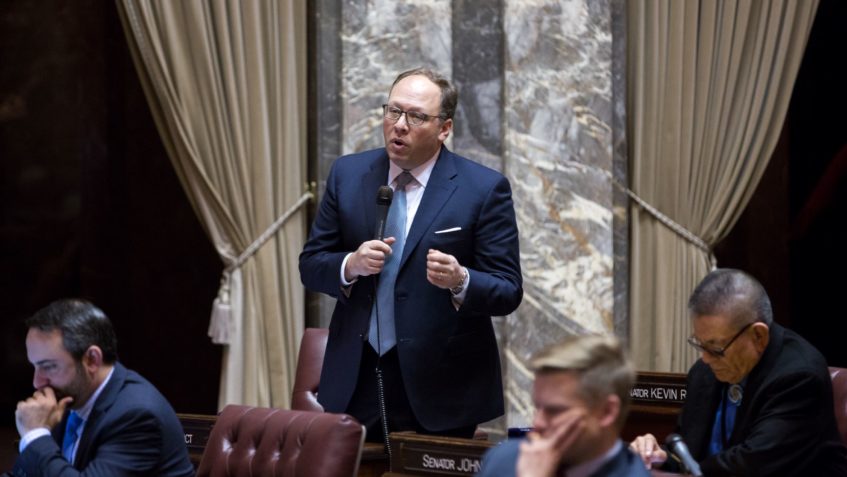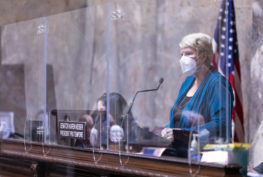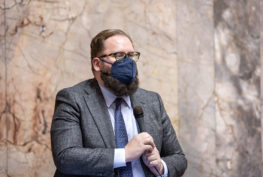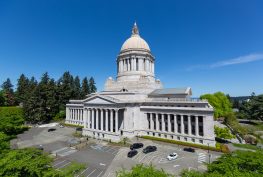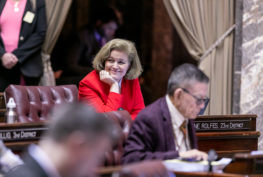OLYMPIA — Senate Democrats’ proposed capital construction budget (Senate Bill 5083), which would be the largest in state history, would build $6.2 billion in priority infrastructure across the state—expanding broadband internet access, growing the state’s affordable housing, safeguarding natural resources, and creating a new Community Relief Fund to invest in underserved communities.
“This budget makes investments across the state that will jumpstart our economic recovery and build long-term prosperity for all Washingtonians,” said Sen. David Frockt (D-Seattle), vice chair of the Senate Ways & Means Committee and the Senate’s lead capital budget writer. “In every area, we are funding projects that will help build a stronger, more equitable state.”
Expanding broadband internet access to rural and underserved areas throughout the state was one of the key recommendations identified in the January report of the Special Committee on Economic Recovery, which Frockt chaired. This budget would make good on that promise to the tune of $490 million.
“We are making a landmark investment in state broadband that can transform the ability of people in every nook and cranny of the state to connect to education, jobs and opportunities,” Frockt said.
The budget includes funds to improve the state’s environmental health, including $389 million for recreation, conservation, and salmon recovery projects as well as $729 million for clean-water efforts and toxics cleanup. The new Nisqually State Park would also receive significant funding for initial development as part of an $86 million overall investment in state parks.
Another $315 million would fund affordable housing grants and loans, including the largest-ever investment in the Housing Trust Fund—$205 million—which builds affordable housing for the long term. The budget would also fund an innovative $90 million Rapid Housing Acquisition program to help Seattle, Tacoma and other locations around the state get unsheltered people into housing as quickly as possible. Local and community projects supported by members of both parties across the state are included in the proposal.
“Even in the best of times, our state construction budget creates valuable jobs and spurs economic growth,” said Sen. Mark Mullet (D-Issaquah), who is part of the capital budget-writing team. “Today, with our state and nation in the midst of a worldwide pandemic, these projects and the family-wage jobs they create are even more critical in helping us build back and in putting our economy on a path to grow in the years to come.”
The budget demonstrates Senate Democrats’ commitment to equity by investing significantly in underserved communities through broadband expansion, affordable housing, and community projects, as well as a new dedicated $13.3 million Community Relief Fund and $3 million for the Communities of Concern Commission. Another $3 million would go to technical assistance grants in the Building Communities Fund to identify and support projects in underserved communities that may be good candidates for future capital funds.
Priority projects in communities that have historically been underserved, including communities of color, would receive significant funding, including $8 million for housing in the north and central districts of Seattle, $5 million for low-income housing in Tacoma, $800,000 to purchase the historic Dr. Nettie Asberry House in Tacoma, and $3.295 million for the didgwalic Wellness Center in Anacortes.
Behavioral health facilities would receive $406 million, with an additional $191 million for the University of Washington’s new Behavioral Health Teaching Facility. Schools would come in for $947 million in construction funding, including $47.2 million in modernization grants for small districts and Tribal compact schools.
Finally, the budget would make historic investments in Washington’s higher education system, with $963 million for four-year institutions and a record $551 million for community and technical colleges. That includes $45.4 million for the College of Engineering Interdisciplinary/Education Research Center at the University of Washington, $36 million for the Academic Innovation Building at the University of Washington-Tacoma, $52.6 million for the Life Sciences Building at Washington State University-Vancouver, $45 million for the first phase of the Science Building renovation at Eastern Washington University, $55.5 million for the Health Education Building at Central Washington University, $51 million for the Electrical Engineering/Computer Science Building at Western Washington University, and $30.5 million for library renovation at North Seattle College.

